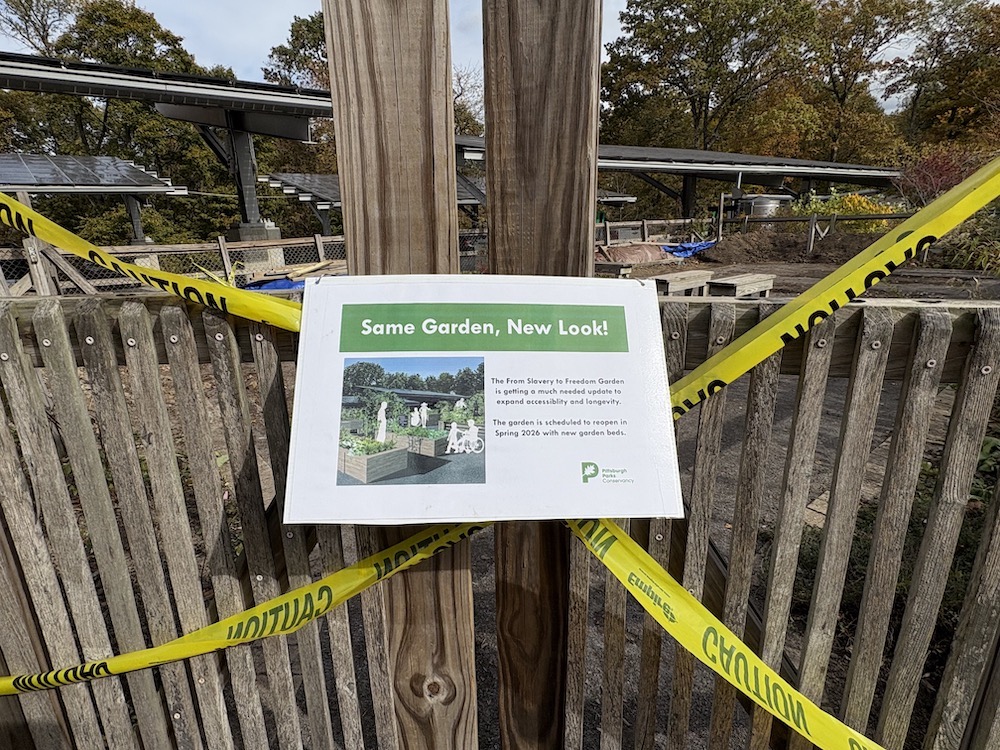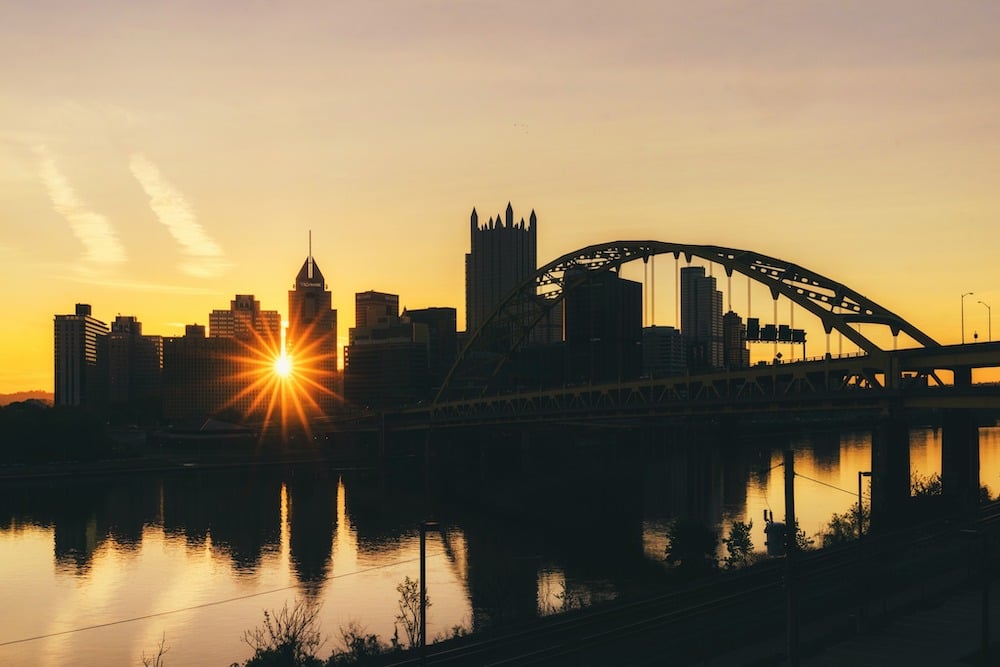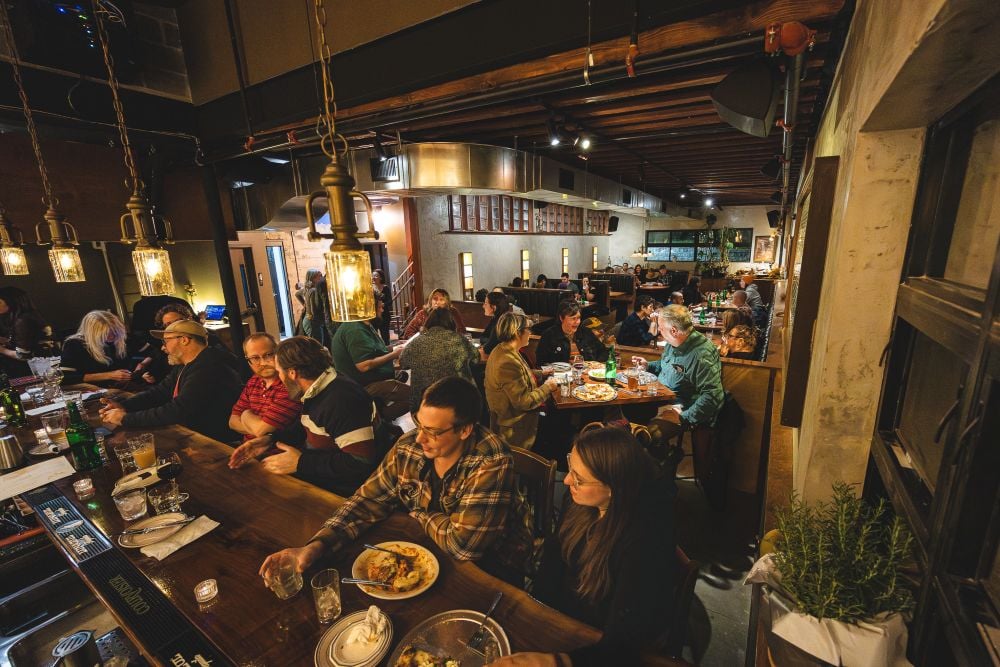Frick Park’s ‘From Slavery to Freedom Garden’ Gets a Refresh
The special garden at the Frick Environmental Center in Squirrel Hill aims to expand accessibility to all.

CONSTRUCTION IS UNDERWAY IN THE FROM SLAVERY TO FREEDOM GARDEN IN FRICK PARK TO MAKE IT ACCESSIBLE FOR ALL. | PHOTO BY NATALEY DAVIS
James Brown, director of education at the Frick Environmental Center in Squirrel Hill, is devoted to making outdoor education and history available to everyone with a thirst for knowledge.
Brown says that one of the ways he teaches about local history through the center’s educational programming is by involving students in the From Slavery to Freedom Garden in Frick Park.
The garden was created in 2017 as an extension of the From Slavery to Freedom immersive exhibit at Heinz History Center. Both the garden and the exhibit highlight Pittsburgh’s history in the trans-Atlantic slave trade that occured from 1501 to the 1880s, when more than 440,000 enslaved people were taken to North America from Africa.
The garden celebrates those who were enslaved in a region of the world foreign to them, but managed to find resources and gain knowledge of the land.
Pittsburgh became a destination for people seeking freedom during this time and was along the path of the Underground Railroad. The garden aims to tell the story by showcasing plants that they used for food and medicinal purposes.

WHEN COMPLETED, THERE WILL BE PAVED PATHS AND GARDEN BEDS OF SEVERAL HEIGHTS TO ACCOMMODATE THOSE WITH A RANGE OF DISABILITIES. | PHOTO BY NATALEY DAVIS
Now, in a new initiative from the nonprofit Pittsburgh Parks Conservatory, the From Slavery to Freedom Garden is undergoing renovations to provide a more accessible experience for guests.
This project follows the opening of the $1.6 million Outdoor Discovery Space and Sensory Nature Trail in May, a new ⅓-mile trail that focuses on stillness, observation and presence, according to Pittsburgh Parks’ Conservancy’s website.
Brown, who also is director of education for the conservancy, says that the creation of the trail prompted the conservancy to shift its focus on improving the park’s existing features with accessibility projects. He finds the mission for the From Slavery to Freedom Garden to be on par with the themes the garden teaches about.
“One of the reasons why we really love this space is, I think from an equity standpoint, it’s really saying to people that everybody’s history matters, everybody’s culture matters,” Brown says. “Park spaces have not historically always been the most accessible nor the most equitable or just, and so I think [the accessibility renovations] speak to that goal.”
Work began on Oct. 20 with volunteers from Whiting-Turner Contracting Company, deconstructing the aging garden beds.
The rebuilding of the garden beds will begin in early November, with an estimated completion date of late December. It will have a grand opening in the spring.
Brandon Riley, director of community projects at the conservancy, outlines the practical ways these renovations will cater to an array of people.
Riley says that a lot of people think of being disabled as simply whether or not someone is in a wheelchair, but there is actually a wide range in between that.
“We have lower garden beds, we have slightly higher garden beds…people are different heights, people might be able to bend down farther than others, but then we also have raised garden beds that someone using a wheelchair can roll under and actually engage with the plant material,” he says.
The extensive list of accessibility improvements includes:
- Wheelchair-accessible garden beds
- Accessible trellis arches and entrance improvements
- A new shade structure for added comfort
- Expanded planting, including sensory planters and perimeter gardens
- Enhanced interpretation and education through QR codes
The conservancy has plans for more projects at the Frick Environmental Center in the future, continuing the initiative for a more accessible campus.
Riley says that the team is beginning a conceptual design for reconstruction of the park’s outdoor amphitheater, which is behind the nature center. It hopes to get started on that in 2027.
The From Slavery to Freedom Garden immerses guests in an important part of history. Brown says this is an experience that everyone should have the opportunity to learn from.
“It’s just a big celebration of food and culture and music and nature, and it’s open to everyone, it’s free,” Brown says. “I think the ways in which we activate and celebrate this space means it’s here for everybody. “










